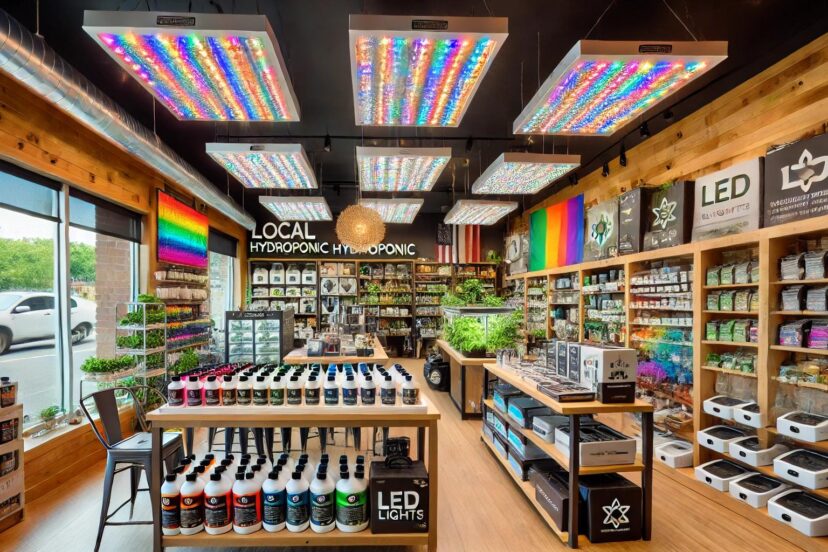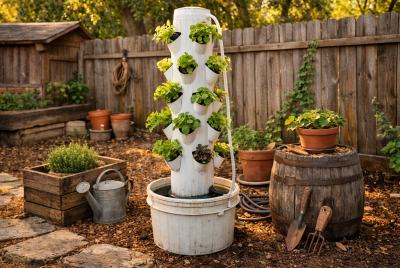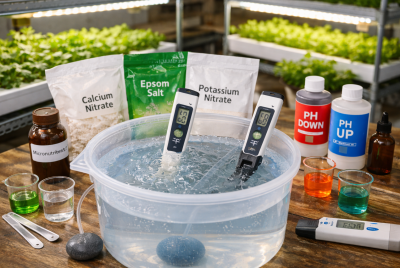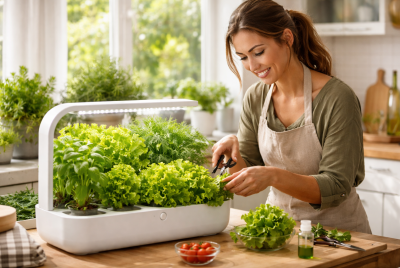Hydroponic Shop Near Me: Your Guide to Modern Gardening
We may earn a commission for purchases made using our links. Please see our disclosure for more details.
Many people love hydroponic gardening because it’s a great way to relieve stress and connect with nature. It’s exciting and fulfilling because you can actually grow plants without soil. Oh, and it’s a space saver too! But if you’re new to this, where do you even start? How will you build your dream green oasis? The first step is to list all the essentials you need, find a ‘hydroponic shop near me’, and then start shopping. Let’s dive deeper into this journey and let me walk you through it step-by-step.
What is Hydroponics?
Hydroponics is from the word “hydro” which means water, and “ponos” meaning work. With that said, it’s a way of growing plants using nutrient solution water, without soil. Because plants get the nutrients straight to their roots, there’s faster plant growth and higher yields. Unlike traditional gardening, hydroponics allows you to control the environment (temperature or moisture) and minimize the chances of pest invasion. It’s also great for those who want to start gardening but have small spaces whether indoor or outdoor.
Hydroponics has been the subject of various research studies that highlight its advantages and potential. For instance, a study from the National Center for Biotechnology Information emphasizes how hydroponic systems allow plants to grow faster by providing direct access to nutrients, which can lead to healthier crops in a controlled environment. Another comprehensive review from ScienceDirect explains how hydroponics helps save water and space, making it an ideal option for urban gardening and sustainable food production. These studies showcase the promising future of hydroponic gardening.
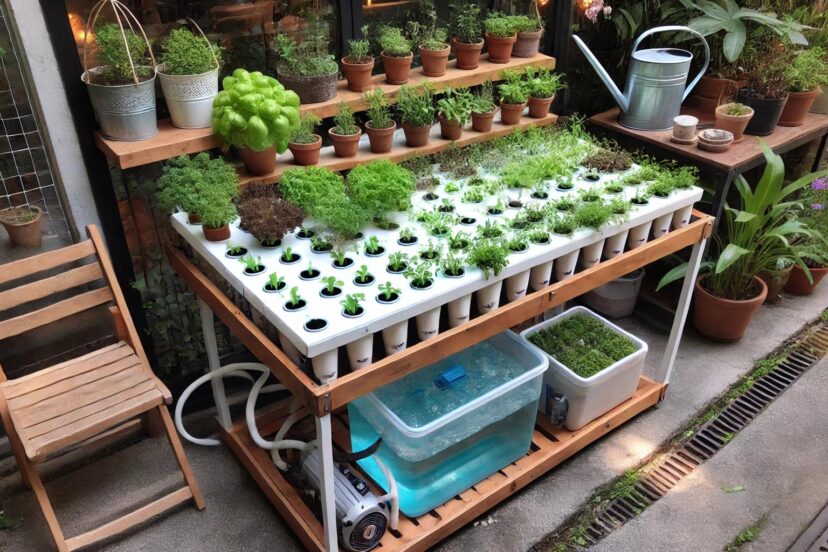
Why You Need a Hydroponic Shop Near You
Starting a hydroponic garden can feel overwhelming but that’s okay. Back then, I didn’t know what to do or how to build my mini lettuce garden. So I created a list of everything I needed (grow kits, nutrient solutions, etc) and went straight to a hydroponic store near me. Not only did that shop have everything I was looking for, but they also gave me hands-on advice about hydroponics. They even suggested the right system for my needs and how many lights my plant will need since I’m setting up a mini indoor garden. So if you’re a newbie, visit your local hydroponics shop first for some expert tips then you can order supplies online after that.
Hydroponic Shops: The Essentials You’ll Find
Hydroponics shops are packed with the tools and equipment you need to make your dream garden come true. Here’s a sneak peek at what you’ll likely find:
– Hydroponic Systems: Are you looking for DWC? NFT? They have systems for everyone, from the curious newbie to the seasoned green thumb.
– Grow Lights: If you’re like me and like to grow indoors, you’ll need to have grow lights. These lights are like mini-suns, giving your plants all the rays they crave.
– Nutrient Solutions: Nutrient solutions are the food of your plants, they need this to thrive. The perfect balance of nutrients is right there in pre-mixed bottles.
– Growing Media: No soil? No problem! Clay pellets, coconut coir—these are the unsung heroes of hydroponic gardening.
– Pumps and Aerators: They keep the water and nutrients flowing like a well-oiled machine.
– Seeds and Clones: Ready-to-grow plants, just waiting to be part of your hydroponic adventure.
Benefits of Shopping Locally
While almost anything is available online with just a click away, it’s still nice to shop in a physical store especially if you haven’t tested a product before. Shopping in-store is a chance to get real-time recommendations. Got a question about which nutrient mix to use? They’ve got you. Not sure if your lighting setup is right? They’ll steer you in the right direction. Plus, you can bring home the product without having to wait for delivery.
Must-Have Products for Your Hydroponic Setup
- Hydroponic Grow Kits – Perfect for beginners, these kits include everything needed to start growing hydroponically, such as growing trays, pumps, and nutrient solutions. Look for customizable kits depending on the plant type.
- LED Grow Lights – Essential for indoor hydroponic systems, LED grow lights mimic natural sunlight and are available in different intensities. They come in full-spectrum varieties to support all stages of plant growth.
- Nutrient Solutions – Since hydroponics doesn’t use soil, plants need specialized nutrient solutions. Look for products rich in essential minerals like nitrogen, phosphorus, and potassium.
- pH Testing Kits – Maintaining the right pH level is crucial for plant growth. Hydroponic shops often sell pH testing kits to ensure the nutrient solution is within the optimal range for absorption.
- Air Pumps and Aerators – These devices ensure the water in your hydroponic system stays oxygenated, promoting healthier plant roots and faster growth. Look for energy-efficient models that are easy to maintain.
How to Find a Hydroponic Shop Near You
Alright, now that we’ve established the importance of having a nearby hydroponic shop, let’s talk about actually finding one. It’s easier than you might think:
1. Google Maps: A quick search for “hydroponic shop near me” should do the trick. It’s like magic, but with GPS.
2. Ask Around: Gardening enthusiasts tend to flock together, so ask your neighbors or hit up an online forum.
3. Check Specialty Gardening Stores: Even those not labeled as “hydroponic specialists” might carry the basics.
4. Visit Farmers’ Markets: Sometimes, the experts come to you, setting up booths with all the essentials.
What to Look for in a Hydroponic Shop
– Knowledgeable Staff: If the employees seem more confused than you, it’s time to walk away.
– Wide Selection: You want variety, from equipment to nutrients.
– Fair Pricing: Know your budget and don’t get caught paying extra just for convenience.
– Customer Reviews: A quick peek online can save you a lot of time and money, trust me. Are people happy with their purchases? That’s your clue.
Can’t Find a Shop? Here’s What to Do
No shop nearby? No problem. You’ve still got options:
– Order Online: While you won’t get the same personal touch, many reputable online stores can ship everything you need.
– DIY Solutions: Feeling crafty? Some of the most impressive hydroponic setups are homemade. With a little elbow grease and a trip to the hardware store, you can build your own.
Sustainability and Hydroponics
One of the best things about hydroponics is its eco-friendliness. In this method, you’re using up to 90% less than traditional gardening. Plus, there’s no need for harmful pesticides or herbicides, it’s organic. Look for organic nutrients and energy-efficient lighting options to make your setup even greener. You got this!
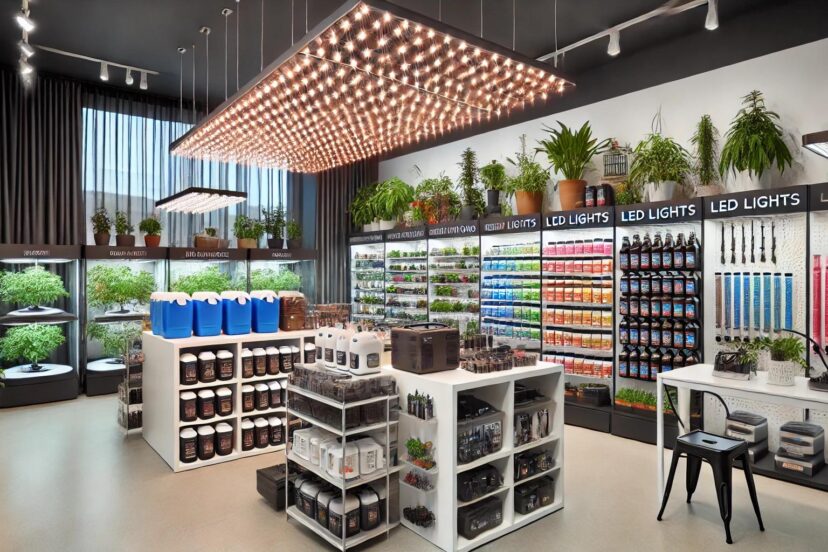
Supporting Local Hydroponic Businesses
Sure, you can buy anywhere you like but when you purchase from a local shop, you’re investing in your community. These small businesses are often run by passionate gardeners (like you and me) who care about sustainability and innovation.
Final Thoughts
Building a green oasis is possible even if you’re a beginner and finding a hydroponic shop near you is the first step. This local shop offers the right tools and products you need to get started. If you’re unsure what you need or if you have questions in mind, they will guide you. So, start your hydroponics journey today and enjoy fresh, home-grown plants all year round!
FAQs
1. What is the best hydroponic system for beginners?
DWC or Deep Water Culture, it’s simple, affordable, and easy to maintain.
2. Can I grow any plant hydroponically?
Yes! While herbs and leafy greens thrive, with the right care, almost any plant can grow hydroponically.
3. How frequently should the water be changed?
For an average-size system, replace the water every two to three weeks.
4. Do hydroponic plants grow faster than traditional plants?
Yes! Because they have direct access to nutrients they often grow quicker than their soil-bound counterparts.
5. What are the most common problems in hydroponic gardening?
pH imbalances, overwatering, and incorrect nutrient mixes—nothing a little monitoring can’t fix!

